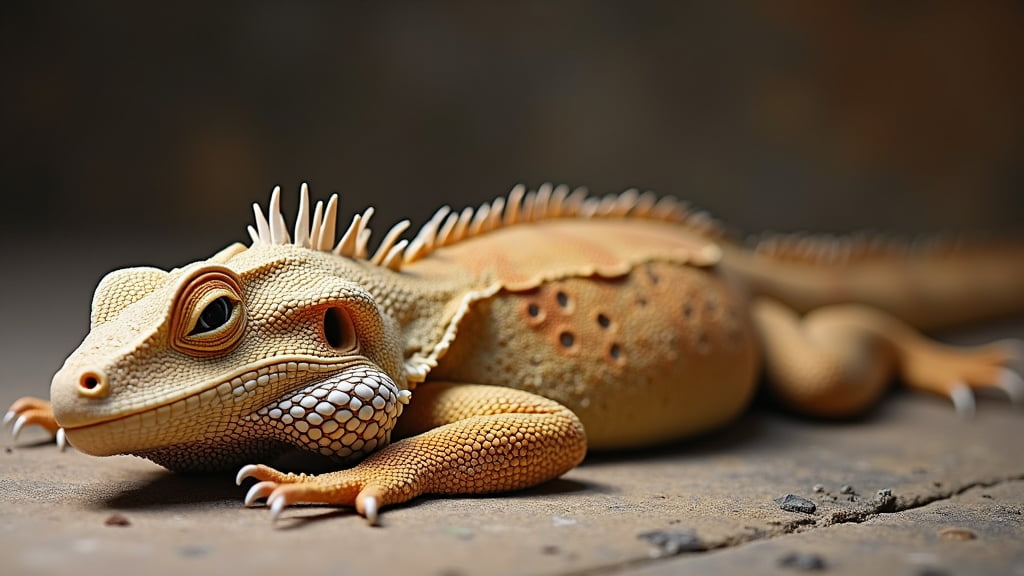
Bearded dragons, affectionately known as “beardies,” are delightful reptilian pets that have captured the hearts of many with their charming personalities and distinctive appearances. However, for many pet owners, understanding bearded dragon sleeping patterns can be quite perplexing. If you’re curious about how and when your scaly friend likes to catch some Z’s, you’re in the right place. In this post, we’ll explore the intricacies of bearded dragon sleep habits, shedding light on their nocturnal behaviour, brumation periods, and more.
The Basic Sleep Cycle of Bearded Dragons
Crepuscular Nature
Bearded dragons are primarily crepuscular, meaning they are most active during twilight hours—both at dawn and dusk. Unlike strictly diurnal or nocturnal animals, they have a unique sleep cycle.
Daytime Naps
Don’t be surprised if you catch your beardie dozing off during the day. Short naps can be quite common, especially if they’ve been particularly active. These naps may last anywhere from a few minutes to an hour and are nothing to worry about.
Night-time Sleep
Bearded dragons are known to sleep through the night, often from dusk until dawn. It’s crucial to provide them with a comfortable and dark environment to mimic their natural habitat. Enclosure conditions play a significant role in ensuring they get quality rest.
Factors Impacting Bearded Dragon Sleep
Temperature and Lighting
Bearded dragons are ectothermic, meaning they rely on external temperatures to regulate their body heat. To ensure they sleep well, maintain an appropriate temperature gradient within their enclosure.
Optimal Temperature Settings
- Daytime basking spot: 35-40°C (95-105°F)
- Cooler side: 24-29°C (75-85°F)
- Night-time temperature: 18-24°C (65-75°F)
Proper Lighting
UVB lighting helps synthesise Vitamin D3 and allows calcium absorption. Maintain a regular light cycle:
- Daylight hours: 12-14 hours of light
- Night-time hours: 10-12 hours of darkness
Brumation Periods
Brumation is a period of dormancy similar to hibernation. During brumation, bearded dragons can sleep for extended periods, often weeks or even months.
Signs of Brumation
- Decreased appetite
- Reduced activity
- Seeking cooler areas to rest
If your bearded dragon begins showing these signs, ensure they are in good health before brumation starts. Always consult a vet for advice.
Creating the Perfect Sleep Environment
Enclosure Setup
A well-designed enclosure is critical for bearded dragon sleep health. Opt for habitats that replicate natural conditions. Use substrates that are comfortable and non-toxic, such as reptile carpet or tile.
Hiding Spots and Accessories
Provide hiding spots and accessories like caves and plants. These elements make your dragon feel secure, which can significantly enhance sleep quality.
Consistency in Routine
Having a consistent routine can help regulate their sleep patterns. Turn lights on and off at the same times each day to help your beardie adhere to a natural cycle.
Noise and Disturbances
Be mindful of noise levels around your bearded dragon’s enclosure, especially during sleep time. Avoid placing the habitat in high-traffic areas.
Health Implications of Sleep
Recognising Sleep Disorders
While bearded dragons usually sleep soundly, disruptions in their sleep patterns can be indicative of health problems. Watch out for:
- Constant restlessness
- Frequent waking
- Lethargy during daylight hours
If you notice any irregular behaviours, it’s essential to seek veterinary advice.
Impact on Overall Wellbeing
Quality sleep is integral to a bearded dragon’s overall health. Improper sleeping conditions can lead to complications like stress, weakened immune response, and behavioural issues.
Conclusion
Understanding bearded dragon sleeping patterns is pivotal to ensuring your pet’s overall health and happiness. Keep in mind their crepuscular nature, the significant impact of temperature and lighting, and the role of a well-set-up enclosure. By emulating their natural environment and maintaining a consistent routine, your bearded dragon will enjoy restful and rejuvenating sleep.
Before making any changes to your dragon’s habitat or routines, always consult a vet to ensure you’re providing the best care possible. Happy dragon keeping!
For more in-depth information, you might also like to read about common bearded dragon behaviour problems.
Find our recommended product here.
Meta Description: Discover everything you need to know about bearded dragon sleeping patterns, their sleep cycles, and how to create the ideal sleep environment for your pet. Expert insights and practical advice for reptile lovers.


